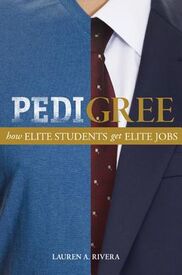Pedigree

How Elite Students Get Elite Jobs
by Lauren A. Rivera
Completed: January 25, 2021- Other
- 392 pages
- ISBN: 9780691155623
- Goodreads page
If you are not aware of most of this book’s contents already, I’d recommend skimming this. But as someone who already went through this recruitment process, both as a student and as an employee, there wasn’t much new to me here. I think this book could really have been a long New Yorker article instead of something book-length (though this is a common criticism of mine for the vast majority of current non-fiction). And the author appeared to pass off too much anecdotal data as some kind of sophistically, systematic ‘data analysis’ which I was not a fan of. I found the discussion of the interviews themselves to be the highlight of the book, but the discussion of biases was masqueraded as data-based and ‘scientific’ while I didn’t think it was.
However, the basic thesis that social class-based stratification is alive and well through our jobs is an important one - especially in the US but something I see increasingly in India as well. And I found the details around the recruitment process that she describes to be almost entirely consistent with my own experience. (Which also made me realize just how consistent these practices are across most such professional services firms, down to the vocabulary used).
I have a slightly even more cynical take about these practices - i) they’re meant to zero in on candidates who care about (or can be made to care about), and can be ruthless about, pursuing status markers, ii) but candidates who’d otherwise be willing to tow the party line & not rebel - sheep who’ll be willing to be stickers for the irrelevant in their striving for status (and not ask too many questions in the process).
But mostly importantly, it is a way to take a set of mostly unnecessary jobs as a means of wealth & status transfer (rather than simply passing it from parent to child, etc. which our modern culture wouldn’t exactly be obvious fans of). I understand why the author wouldn’t explore this theme in such a book (which is tried to be presented as a careful data-based sociological study, rather than a philosophical exploration). But I wish the author could at least allude to the possibility that these are, mostly, ultimately irrelevant jobs that serve the purpose of wealth/status transfer.
This thesis is important because if true, the author’s possible solutions won’t ever really work. For example, she writes that the relationship between the types of hiring practices used here and organizational performance should be measured. If the above thesis is reasonably valid, then this won’t particularly achieve anything - organizatinonal performance will in fact be highly correlated with these types of hiring practices. What one can’t ever study (in a natural setting) is that if one were to relax these hiring practices completely - essentially randomly choosing any applicant from the pile - chances are that organizational performance (at the analyst/associate level) would still be very good. That’s becaues organizational performance at that level simply doesn’t matter - it’s a mostly irrelevant job to begin with.
I did find it funny that quite a few of the professionals interviewed by the author talked about self-awareness and maturity being traits they look for.
Just a couple of quotes from the book to give you a sense of what’s covered -
…failure to attend a super-elite school was an indicator of intellectual failure, regardless of a student’s grades or standardized test scores.
I particularly liked this one, which focused on a pet peeve of mine throughout this recruitment process:
An essential part of telling an effective story (in the interview) was to present one’s experiences as resulting from a series of personal decisions rather than from serendipitous circumstances, such as chance or luck, or from access (or barriers) to valuable opportunities.”
The author then discusses why this type of narrative style had significant socioeconomic dimensions - i) it presumes candidates had choices to begin with at their fingertips, ii) even the freedom to choose jobs and schools based on individual ‘passion’ or desires for self-actualization is an economically privileged way of perceiving life choices, iii) a narrative style that emphasizes individual chocie, freedom, and distinctiveness (as opposed to being shaped by your environment) is a more middle- and upper-class way of perceiving the world, and iv) the idea that an individual directly controls one’s fate is a specifically American way of framing the world.
Many popular and scholarly accounts insist that a closed, American elite based on inherited resources and school ties is a vestige of the past. Gone are the days when spots in prestigious schools and firms were restricted to white, male, Anglo-Saxon Protestants from “good” families. In their place has emerged a new class of elites, consisting of investment bankers, management consultants, Wall Street lawyers, and CEOs rather than Cabots or Kennedys. Marked by alma maters, marathon times, blue-chip firms, and hours billed rather than race, religion, or family names, these individuals are depicted as having risen to the top through their superior talents, abilities, and accomplishments rather than through advantages provided to them by birth. They are perceived by many to be an aristocracy of merit rather than an enclave of passed-on privilege.
…
Although in theory competition is now open to all, in practice, entry to these lucrative and coveted organizations is still restricted to a small group of individuals who display high-status signals associated with privileged social origins. New membres are disproportionately drawn from the nation’s most prestigious universities.
All book cover images are from Goodreads unless specified otherwise.